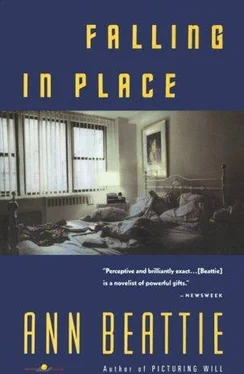Ann Beattie - Falling in Place
Здесь есть возможность читать онлайн «Ann Beattie - Falling in Place» весь текст электронной книги совершенно бесплатно (целиком полную версию без сокращений). В некоторых случаях можно слушать аудио, скачать через торрент в формате fb2 и присутствует краткое содержание. Год выпуска: 1991, Издательство: Vintage, Жанр: Современная проза, на английском языке. Описание произведения, (предисловие) а так же отзывы посетителей доступны на портале библиотеки ЛибКат.
- Название:Falling in Place
- Автор:
- Издательство:Vintage
- Жанр:
- Год:1991
- ISBN:нет данных
- Рейтинг книги:4 / 5. Голосов: 1
-
Избранное:Добавить в избранное
- Отзывы:
-
Ваша оценка:
- 80
- 1
- 2
- 3
- 4
- 5
Falling in Place: краткое содержание, описание и аннотация
Предлагаем к чтению аннотацию, описание, краткое содержание или предисловие (зависит от того, что написал сам автор книги «Falling in Place»). Если вы не нашли необходимую информацию о книге — напишите в комментариях, мы постараемся отыскать её.
Falling in Place — читать онлайн бесплатно полную книгу (весь текст) целиком
Ниже представлен текст книги, разбитый по страницам. Система сохранения места последней прочитанной страницы, позволяет с удобством читать онлайн бесплатно книгу «Falling in Place», без необходимости каждый раз заново искать на чём Вы остановились. Поставьте закладку, и сможете в любой момент перейти на страницу, на которой закончили чтение.
Интервал:
Закладка:
At the end of the summer Spangle thought it would be a good idea to drive her back East. They took turns driving, and she made it back to school two days before classes started. In those two days, he worked on her constantly to forget about college and come back to the West Coast with him. She wouldn’t. Finally he moved in with her. Their only disagreements were about the West Coast versus the East Coast. That, and Spangle’s childishness: He would hide behind doors and jump out at her, or come to the door naked when she had a friend with her. When he was out of the apartment, he would call her and pretend, always convincingly, to be a librarian demanding an overdue book, or someone at the garage saying they had made a mistake fixing her car and under no circumstances to drive it, or someone from one of her classes asking her for a date.
Her family didn’t like him. At Thanksgiving dinner he announced his switch to vegetarianism; he wouldn’t laugh at their jokes; he was seven years older than she was. She lost touch with him in 1977, when he left for nine months to get his head straight. He became a lifeguard at a country club pool in Hyannis and, in the winter, a copy editor in Boston. Then he came back as though he had hardly been gone, gradually easing himself out of Valium and back to grass. All of this — even Berkeley — was after the time when he had money. They had been together again for two years, and if he came back from Spain, they would still be together.
She looked in her wallet and saw that she had more money than she had thought. She got a cab and went to Battery Park and stood in line to buy a ticket for the boat ride to the Statue of Liberty. In spite of the sign posted to the left of the ticket window saying how long the ride was, the women in front of Cynthia kept debating whether it was a long ride or a short ride. One wanted to take the ride no matter what, but the other was hesitant. One wanted to stand in line, and the other didn’t know if they weren’t wasting time. Both looked at their watches. They had the same conversation twice before they got to the window and began to question the ticket seller. Going away with their tickets, both looked at their watches.
There was hardly any wait. The line was forming, the boat was there, and she got into the crowd. A lot of people had cameras. Cameras and children. On one of the benches a man in a Mouse-keteer hat sat playing his guitar and singing an off-key version of “Who Knows Where the Time Goes?”
On the boat, she went to the upper deck and sat at the far end of one of the benches. When the boat began to move, she got up and leaned against the railing, looking back at New York. She could see more and more of it, at first larger and larger, then suddenly smaller as the boat moved forward. It was cold and windy and sunny, and she missed Spangle. She kept watching the skyline. There was a feeling of power in going away from it.
She stared behind her the whole way out, and it was only at the last minute that she looked to her left and saw the Statue of Liberty. She didn’t get off. She sat there and looked all around, waiting for the ride back to begin. A few other people also stayed behind: a girl in her early twenties with a man in his fifties who kept pulling her sweater tighter over her chest, his fingers lingering on her small breasts as he adjusted the sweater; a man with a briefcase who tapped his thumb on the lock and never stopped staring at the Statue of Liberty; a young couple with an infant, who spoke in whispers, and a woman in a pink skirt slit halfway up her thigh and a thick, pale-pink sweater, who carried a small dog pressed against her chest. Passing Cynthia, she told the dog, “Je suis très fatiguée.”
Sailing back to New York, Cynthia began to feel a little guilty. They wouldn’t have been able to get a substitute that late in the day, and she couldn’t understand why she had taken such a dislike to so many of the students. She thought that, in part, it might be jealousy. She had always thought that it might be nice to be an ordinary person with an ordinary mind — at best, their minds were ordinary. Spangle always said that that was just wishful thinking: People not worrying about errors in Shakespeare criticism were worried about their wash not coming out clean. And everyone was worried about Skylab.
A little boy sitting in back of Cynthia said quite clearly, “I want to be a car.”
The woman sitting next to Cynthia laughed quietly when the child spoke. She shifted a little farther away and put her head on the shoulder of the man next to her. He kissed her forehead. Cynthia pretended to be looking at the horizon. She had liked being alone for a while, but Spangle had been gone too long. She closed her eyes and made a wish: that when she got back to his apartment, there would be a letter from him saying that he was coming back on schedule. It was true that he drove her crazy in New York, making her look up and down and into windows, but he also pointed out cabs coming too fast, people talking to themselves that it was best to cross the street to avoid.
When the boat docked, Cynthia saw the man in the Mouse-keteer hat again, but this time he was lying on the grass on his stomach, guitar next to him like one person stretched next to another. She sat on a bench in Battery Park for quite a while, face turned toward the sun. Then she got up and walked toward the World Trade Center. She kept losing sight of it and had almost given up when she saw it ahead of her. She liked to walk through it. She went inside and walked around, looking in bookstore windows, into the flower shop. When she left, she took a cab back to Sixth Avenue and Tenth Street and got her car. She was as tired as she used to get when Spangle was there pointing everything out.
Back in the apartment in New Haven, she got her wish. When she opened the mailbox, the first thing she saw was a post card of Spanish dancers in brightly colored skirts, wide as Ferris wheels. She ran upstairs and opened the door before she read it. She even put on the kitchen fan before she read it. Then she sat on the kitchen counter and turned the card over. The message was not all she had hoped it would be. She read: “Sí, Señorita! The castanets click shut faster than a Southern debutante’s cunt. Olé and see you soon. Love, Spangle.”

Why Spangle? Because there was no one like him, that was part of it. One day in Berkeley he had taken her hand, before they were even out of bed, and asked if he could hold it all day. When they had to go to the bathroom, they had walked back to the apartment so they wouldn’t have to let go of each other’s hands. They had walked along swinging hands. They had propped their elbows on a tabletop and hand-wrestled. He had kissed her hand, rubbed it. “I’m pretending I can keep you,” he had said. “I’m pretending it’s as easy as this.”
Six

JOHN JOEL did not like his grandmother’s house. Everything in the house was lumpy: The arms of all the chairs had carvings on them, the bedspreads felt like popcorn, even the dinner plates, with the embossed eagles, made it seem like there was something underneath your food that shouldn’t be there. Most of the things, of course, were not to be touched — especially not the vases that were all over the house, centered on black lacquered pedestals. On the first floor, there were heavy brocade drapes that were pulled back in the morning by the housekeeper; underneath them were thin white curtains that stayed drawn so that the sunlight would not fade the colors in the vases. None of the vases were filled with flowers. Outside in his grandmother’s garden were clematis, roses, phlox, daisies, violets, coleus, lilacs and marigolds. A gardener came to take care of them, and when he left, he carried away piles of flowers — usually two cardboard boxes full, in the back seat of his car. He tied the stems together loosely with string, misted them, washed his hands under the outside faucet, shook them dry, then got in the car and went away without saying goodbye. He was a good gardener, even though John Joel’s grandmother said he was eccentric. He asked his father what “eccentric” meant, and his father said, “Just imagine your grandmother.” His mother said that his grandmother dignified her alcoholism by calling it an eccentricity. He noticed that lately his grandmother did not drink.
Читать дальшеИнтервал:
Закладка:
Похожие книги на «Falling in Place»
Представляем Вашему вниманию похожие книги на «Falling in Place» списком для выбора. Мы отобрали схожую по названию и смыслу литературу в надежде предоставить читателям больше вариантов отыскать новые, интересные, ещё непрочитанные произведения.
Обсуждение, отзывы о книге «Falling in Place» и просто собственные мнения читателей. Оставьте ваши комментарии, напишите, что Вы думаете о произведении, его смысле или главных героях. Укажите что конкретно понравилось, а что нет, и почему Вы так считаете.












